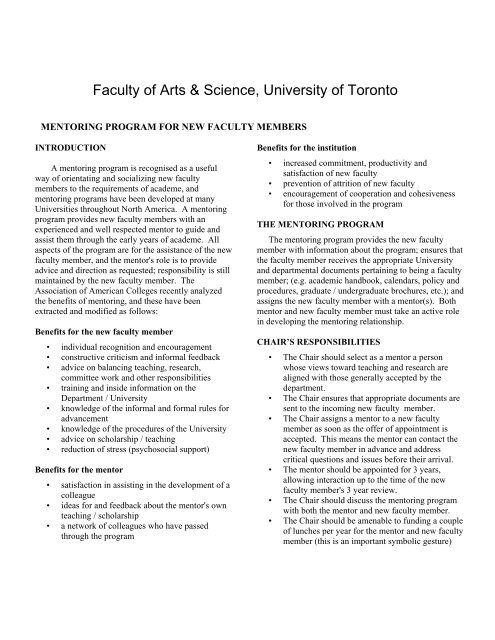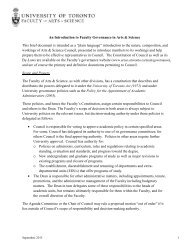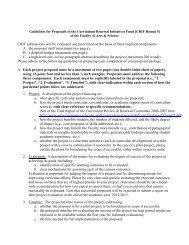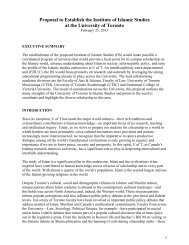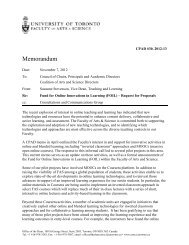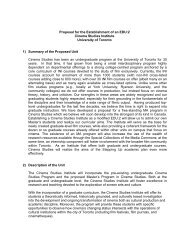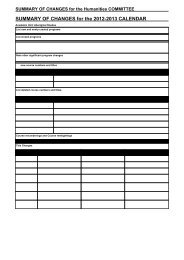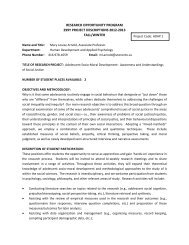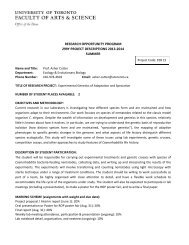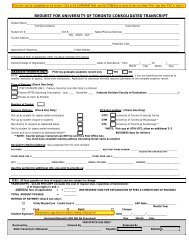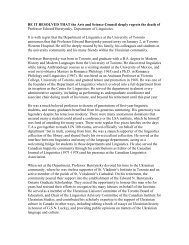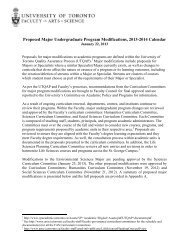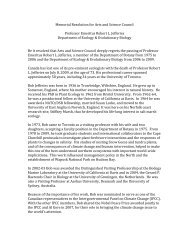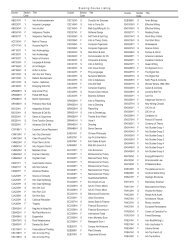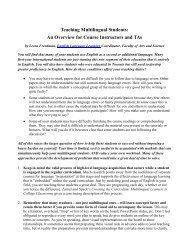Mentoring Program - the Faculty of Arts & Science - University of ...
Mentoring Program - the Faculty of Arts & Science - University of ...
Mentoring Program - the Faculty of Arts & Science - University of ...
- No tags were found...
Create successful ePaper yourself
Turn your PDF publications into a flip-book with our unique Google optimized e-Paper software.
<strong>Faculty</strong> <strong>of</strong> <strong>Arts</strong> & <strong>Science</strong>, <strong>University</strong> <strong>of</strong> TorontoMENTORING PROGRAM FOR NEW FACULTY MEMBERSINTRODUCTIONA mentoring program is recognised as a usefulway <strong>of</strong> orientating and socializing new facultymembers to <strong>the</strong> requirements <strong>of</strong> academe, andmentoring programs have been developed at manyUniversities throughout North America. A mentoringprogram provides new faculty members with anexperienced and well respected mentor to guide andassist <strong>the</strong>m through <strong>the</strong> early years <strong>of</strong> academe. Allaspects <strong>of</strong> <strong>the</strong> program are for <strong>the</strong> assistance <strong>of</strong> <strong>the</strong> newfaculty member, and <strong>the</strong> mentor's role is to provideadvice and direction as requested; responsibility is stillmaintained by <strong>the</strong> new faculty member. TheAssociation <strong>of</strong> American Colleges recently analyzed<strong>the</strong> benefits <strong>of</strong> mentoring, and <strong>the</strong>se have beenextracted and modified as follows:Benefits for <strong>the</strong> new faculty member• individual recognition and encouragement• constructive criticism and informal feedback• advice on balancing teaching, research,committee work and o<strong>the</strong>r responsibilities• training and inside information on <strong>the</strong>Department / <strong>University</strong>• knowledge <strong>of</strong> <strong>the</strong> informal and formal rules foradvancement• knowledge <strong>of</strong> <strong>the</strong> procedures <strong>of</strong> <strong>the</strong> <strong>University</strong>• advice on scholarship / teaching• reduction <strong>of</strong> stress (psychosocial support)Benefits for <strong>the</strong> mentor• satisfaction in assisting in <strong>the</strong> development <strong>of</strong> acolleague• ideas for and feedback about <strong>the</strong> mentor's ownteaching / scholarship• a network <strong>of</strong> colleagues who have passedthrough <strong>the</strong> programBenefits for <strong>the</strong> institution• increased commitment, productivity andsatisfaction <strong>of</strong> new faculty• prevention <strong>of</strong> attrition <strong>of</strong> new faculty• encouragement <strong>of</strong> cooperation and cohesivenessfor those involved in <strong>the</strong> programTHE MENTORING PROGRAMThe mentoring program provides <strong>the</strong> new facultymember with information about <strong>the</strong> program; ensures that<strong>the</strong> faculty member receives <strong>the</strong> appropriate <strong>University</strong>and departmental documents pertaining to being a facultymember; (e.g. academic handbook, calendars, policy andprocedures, graduate / undergraduate brochures, etc.); andassigns <strong>the</strong> new faculty member with a mentor(s). Bothmentor and new faculty member must take an active rolein developing <strong>the</strong> mentoring relationship.CHAIR’S RESPONSIBILITIES• The Chair should select as a mentor a personwhose views toward teaching and research arealigned with those generally accepted by <strong>the</strong>department.• The Chair ensures that appropriate documents aresent to <strong>the</strong> incoming new faculty member.• The Chair assigns a mentor to a new facultymember as soon as <strong>the</strong> <strong>of</strong>fer <strong>of</strong> appointment isaccepted. This means <strong>the</strong> mentor can contact <strong>the</strong>new faculty member in advance and addresscritical questions and issues before <strong>the</strong>ir arrival.• The mentor should be appointed for 3 years,allowing interaction up to <strong>the</strong> time <strong>of</strong> <strong>the</strong> newfaculty member's 3 year review.• The Chair should discuss <strong>the</strong> mentoring programwith both <strong>the</strong> mentor and new faculty member.• The Chair should be amenable to funding a couple<strong>of</strong> lunches per year for <strong>the</strong> mentor and new facultymember (this is an important symbolic gesture)
MENTOR’S RESPONSIBILITIES• The mentor should advise <strong>the</strong> new facultymember in aspects <strong>of</strong> teaching, research andcommittee work or be able to direct <strong>the</strong> newfaculty member to <strong>the</strong> appropriate individuals.• The mentor should be cognisant <strong>of</strong> <strong>the</strong> tasks <strong>of</strong><strong>the</strong> mentor in terms <strong>of</strong> short term and long termgoals.• Confidentiality - The mentor should treat alldealings and discussions in confidence. There isno requirement to report to <strong>the</strong> administration.There is no evaluation or assessment <strong>of</strong> <strong>the</strong> newfaculty member, only supportive guidance andconstructive criticism for <strong>the</strong> efforts. With thisin mind, <strong>the</strong>re should be care exercised in using<strong>the</strong> mentor on <strong>the</strong> three year review and clearly<strong>the</strong> new faculty member must approve (oro<strong>the</strong>rwise) <strong>the</strong> mentor as a reviewer.Review <strong>of</strong> Mentorship <strong>Program</strong>The Mentorship <strong>Program</strong> will be reviewed each year by<strong>the</strong> Office <strong>of</strong> <strong>the</strong> Dean in consultation with Chairs,mentors and new faculty members. The Office <strong>of</strong> <strong>the</strong>Dean will consult mentors and new faculty members foradvice and feedback during <strong>the</strong> program.Changing Mentors• In cases <strong>of</strong> changing commitments,incompatibility or where <strong>the</strong> relationship is notmutually fulfilling, <strong>the</strong>n ei<strong>the</strong>r <strong>the</strong> new facultymember or mentor should seek advice frominformal advisors, Associate Dean or Dean. It isimportant to realise that changes can and shouldbe made without prejudice or fault.• Changing <strong>of</strong> mentors should be considered if <strong>the</strong>mentor is clearly and consistently uninterested in<strong>the</strong> program, discourages or undervalues <strong>the</strong> newfaculty member's abilities, indicates conflict <strong>of</strong>interest or form <strong>of</strong> prejudice, or simply appearsto be incompatible.• The new faculty member, in any case, should beencouraged to seek out additional mentors as <strong>the</strong>need arises.THE MENTORMentors have been defined as individuals withadvanced experience and knowledge who arecommitted to helping ano<strong>the</strong>r person in <strong>the</strong>ir careerplanning. A mentor has qualities <strong>of</strong> wisdom andguidance, and <strong>the</strong> ability to provide opportunities anddirection. Studies have shown that mentoringrelationships can contribute significantly to a person'scareer development and satisfaction. As such, goodmentoring is a challenge which requires dedicatedmentors. The following guide has been modified from<strong>the</strong> MIT brochure for incoming faculty.Qualities <strong>of</strong> a Good Mentor• Availability - The mentor must be available to<strong>the</strong> new faculty member, must keep in contact,and be prepared to spend time discussing<strong>University</strong> affairs, reading proposals andpapers, and reviewing <strong>the</strong> new facultymember's progress.• Networking - The mentor should be in aposition to help establish a pr<strong>of</strong>essionalnetwork for <strong>the</strong> new faculty member.• Support - The mentor should be prepared toargue in support <strong>of</strong> <strong>the</strong> new faculty member(e.g. space, students, funds etc.)• The mentor should treat all dealings anddiscussions in confidence, providingsupportive guidance and constructive criticism.Goals for <strong>the</strong> MentorShort term goals• Familiarisation with <strong>the</strong> <strong>University</strong> and itsenvironment• Sorting out priorities - budgeting time, settingup a lab, publications, teaching, committees• Networking - introduction to colleagues,identification <strong>of</strong> o<strong>the</strong>r possible mentors• Sources <strong>of</strong> research funds and support inapplication writing• Dealing with difficulties - lab space, access tostudents• Advise on dealing with academic <strong>of</strong>fences• Constructive criticism and encouragement,Compliment on achievements2
Long term goals• Advise on criteria for promotion and tenure,and make aware <strong>of</strong> <strong>the</strong> expectations in variouscategories (scholarship, teaching, graduatesuper- vision).• Discuss where <strong>the</strong> pr<strong>of</strong>essional pr<strong>of</strong>ile shouldbe after 3 years.• Discuss what progress might be expectedduring <strong>the</strong> first 3 years.TYPICAL ISSUESThe issues listed below are typical, though not allinclusive, <strong>of</strong> <strong>the</strong> type which should be considered by<strong>the</strong> new faculty member and <strong>the</strong> mentor.• How does one establish an appropriate balancebetween teaching, research, and committeework? How does one say "no"?• What funds are available from <strong>the</strong> department /<strong>University</strong>? Start-up funds, graduatescholarships, travel / conference, smallequipment funds, etc.• How is <strong>the</strong> department organized? How aredecisions made? What infrastructure isavailable to <strong>the</strong> new faculty member?• What should <strong>the</strong> pr<strong>of</strong>essional pr<strong>of</strong>ile be after 3years?• What criteria are used for teaching excellence,how is teaching evaluated, and what is ateaching dossier?• What are <strong>the</strong> grading guidelines for courses?• How does one obtain feedback concerningteaching?• What resources are available for teachingenhancement?• How does one become a member <strong>of</strong> <strong>the</strong>Graduate <strong>Faculty</strong>?• What should graduate students expect from<strong>the</strong>ir supervisor?• What teaching assistantships are available?What should be done about TA training?• What are <strong>the</strong> Health and Safety implications torunning a laboratory?• What committees should one be on and howmuch committee work should one expect?• How does <strong>the</strong> 3 year review proceed and howis tenure achieved?• What should be included in <strong>the</strong> annual activityreport?• Will <strong>the</strong>re be feedback about performance from<strong>the</strong> Chair, if so how <strong>of</strong>ten?• What social events occur in <strong>the</strong> department, whatseminars / workshops?• What are <strong>the</strong> policies concerning maternity,family or personal leaves?As can be seen <strong>the</strong>se typical issues extend over abroad range <strong>of</strong> expertise and advice may need to besought from a broader population <strong>of</strong> <strong>the</strong> <strong>University</strong>.Examples <strong>of</strong> Related <strong>University</strong> <strong>of</strong> TorontoPublications(not complete, Departments should establish <strong>the</strong>ir own list)·Orientation Guide for New Academic and AdministrativeStaff, <strong>University</strong> <strong>of</strong> Toronto·Getting <strong>the</strong>re - a student guide to <strong>the</strong> <strong>University</strong> <strong>of</strong>Toronto·Connaught fund for new faculty members·Undergraduate/Graduate calendar·Departmental brochures - Undergraduate/GraduateHandbooks·Teaching/Research Awards·Sexual Harassment Policy and Brochures·Equity issues·Policies and Procedures·Academic HandbookPublications on <strong>Mentoring</strong><strong>Mentoring</strong>: Contemporary Principles and Issues, Bey andHolmes, Association <strong>of</strong> Teacher Educators, Reston,Virginia, 1992.<strong>Mentoring</strong> Means Future Scientists, Association for Women in<strong>Science</strong> (AWIS), Washington, D.C., 1993.Information Brochure for Incoming Women <strong>Faculty</strong>,Massachusetts Institute <strong>of</strong> Technology.The Department Chairperson's Role in Enhancing CollegeTeaching, A.F. Lucas, Jossey-Bass, Publisher, SanFrancisco, 1989.Framework for <strong>the</strong> <strong>Mentoring</strong> <strong>of</strong> New <strong>Faculty</strong> Members,<strong>University</strong> <strong>of</strong> Toronto <strong>Faculty</strong> <strong>of</strong> Applied <strong>Science</strong> andEngineering.A Ph.D. is Not Enough! A Guide to Survival in <strong>Science</strong>, P.J.Feibelman, Addison Wesley, 1993.3


